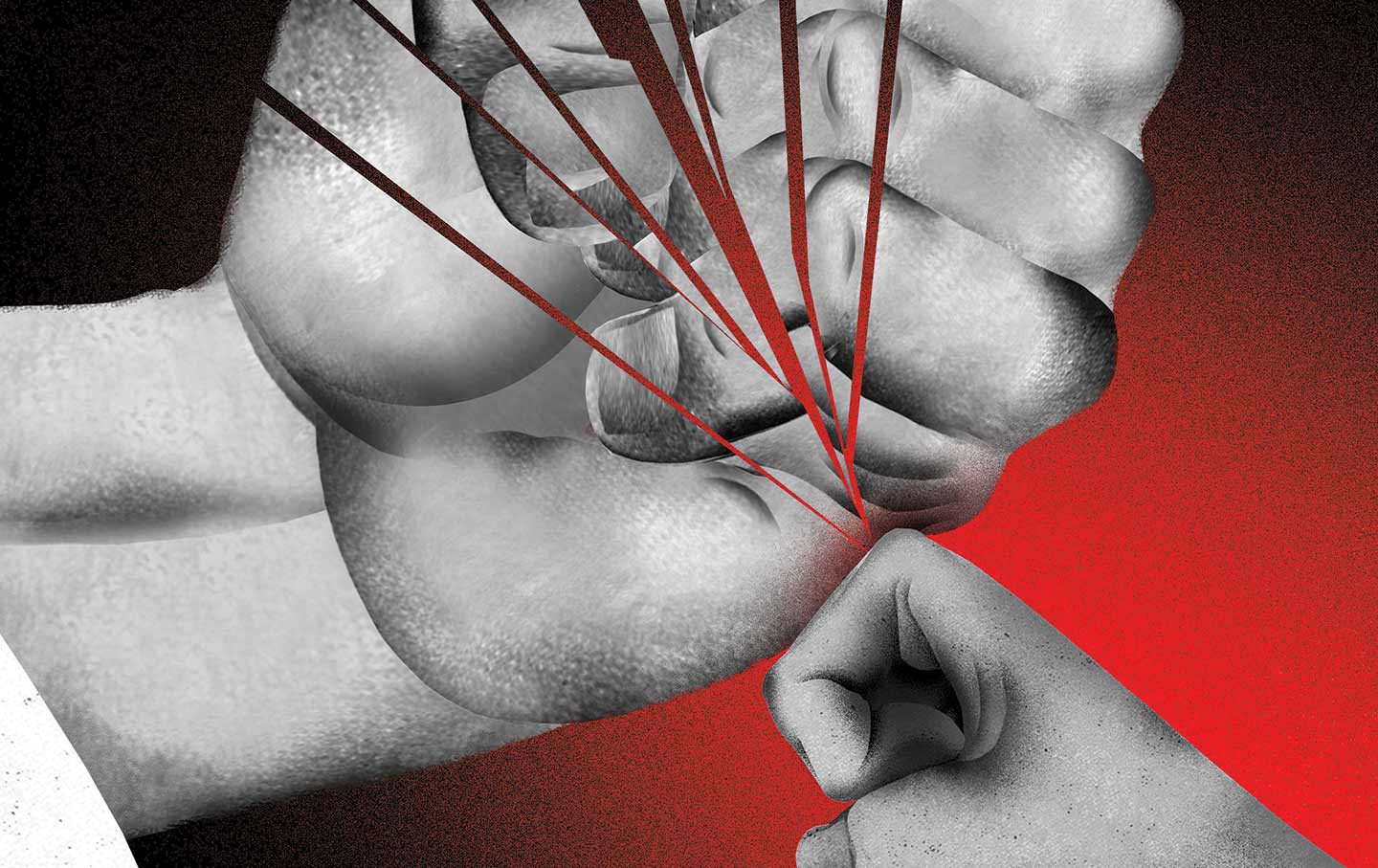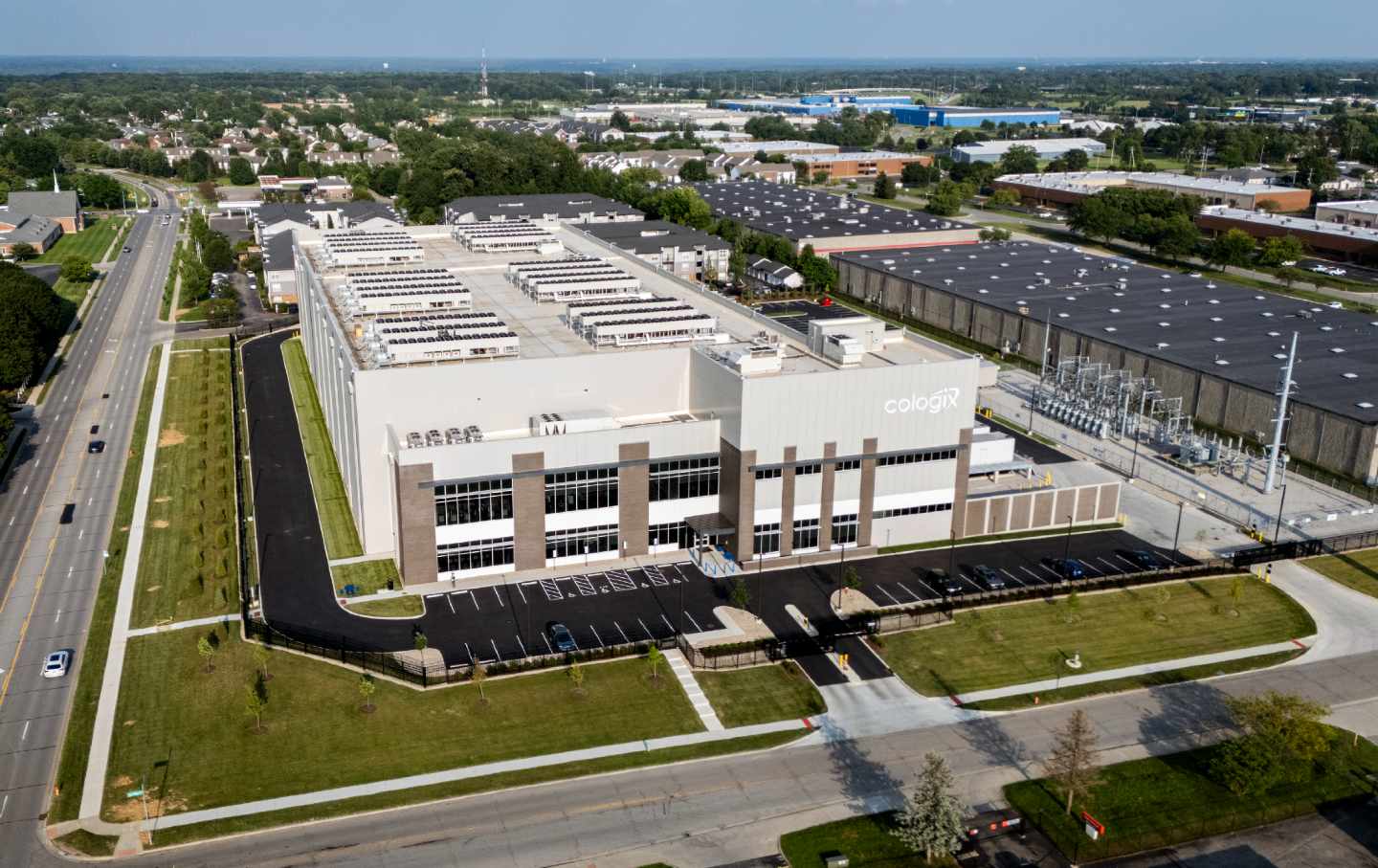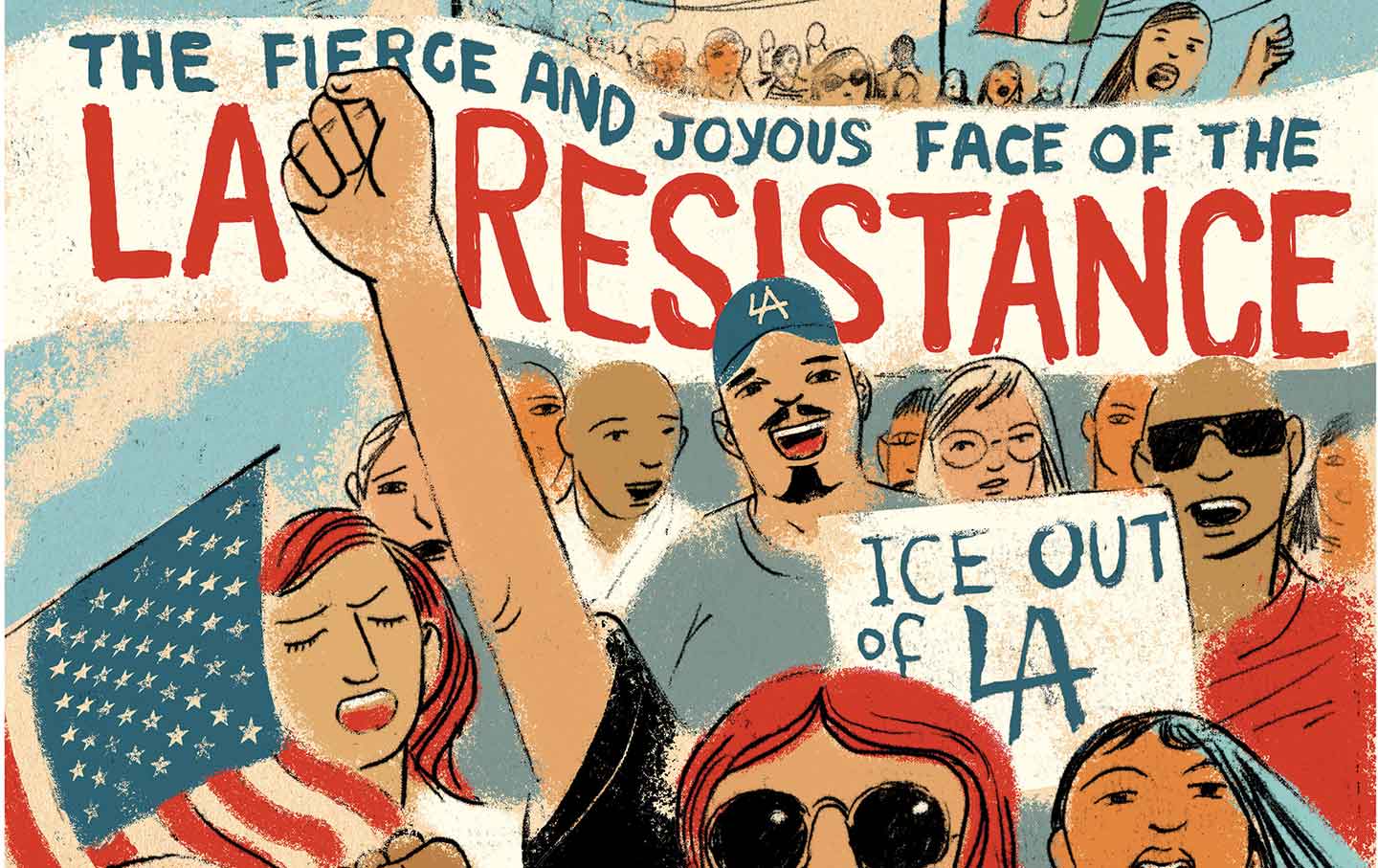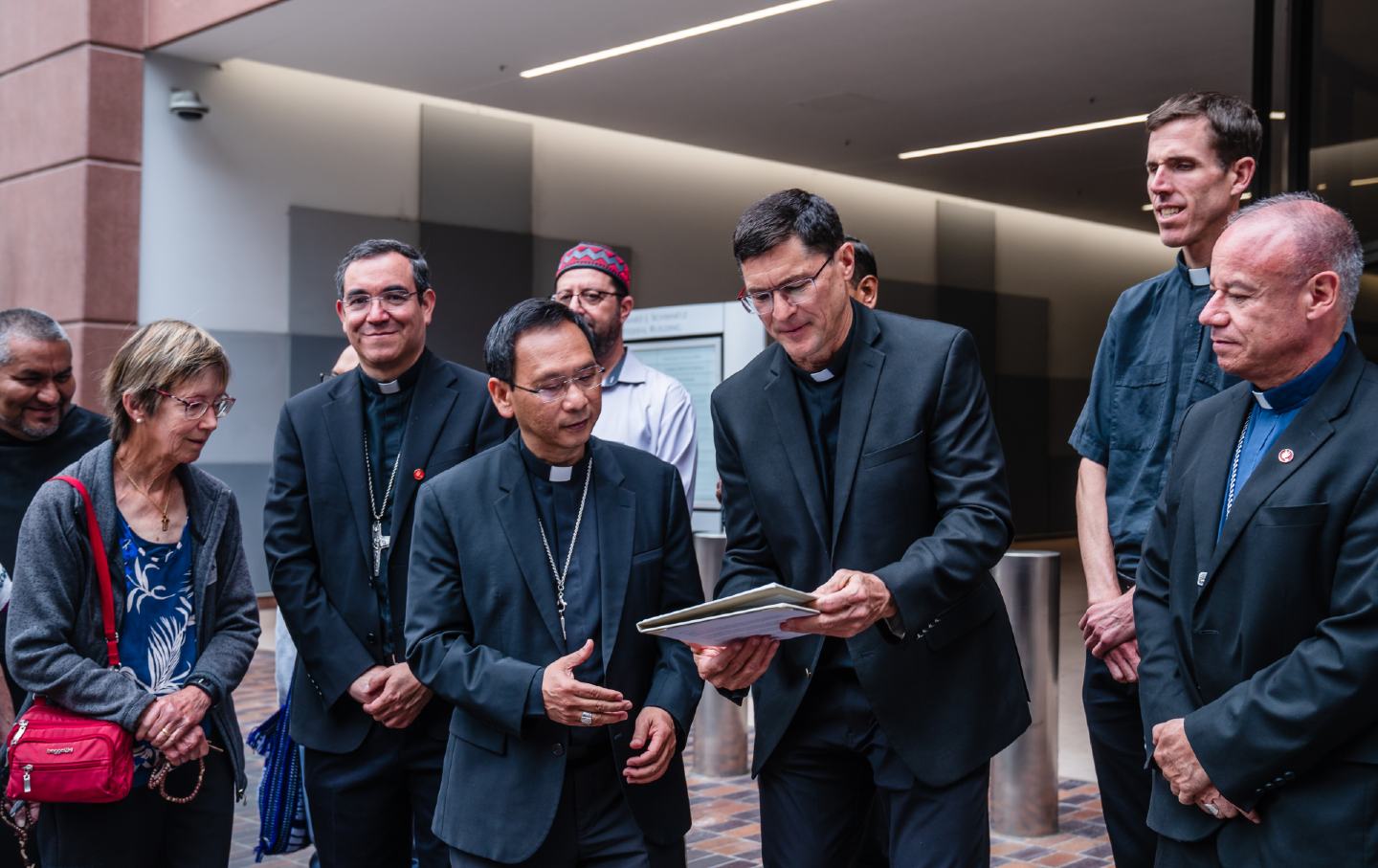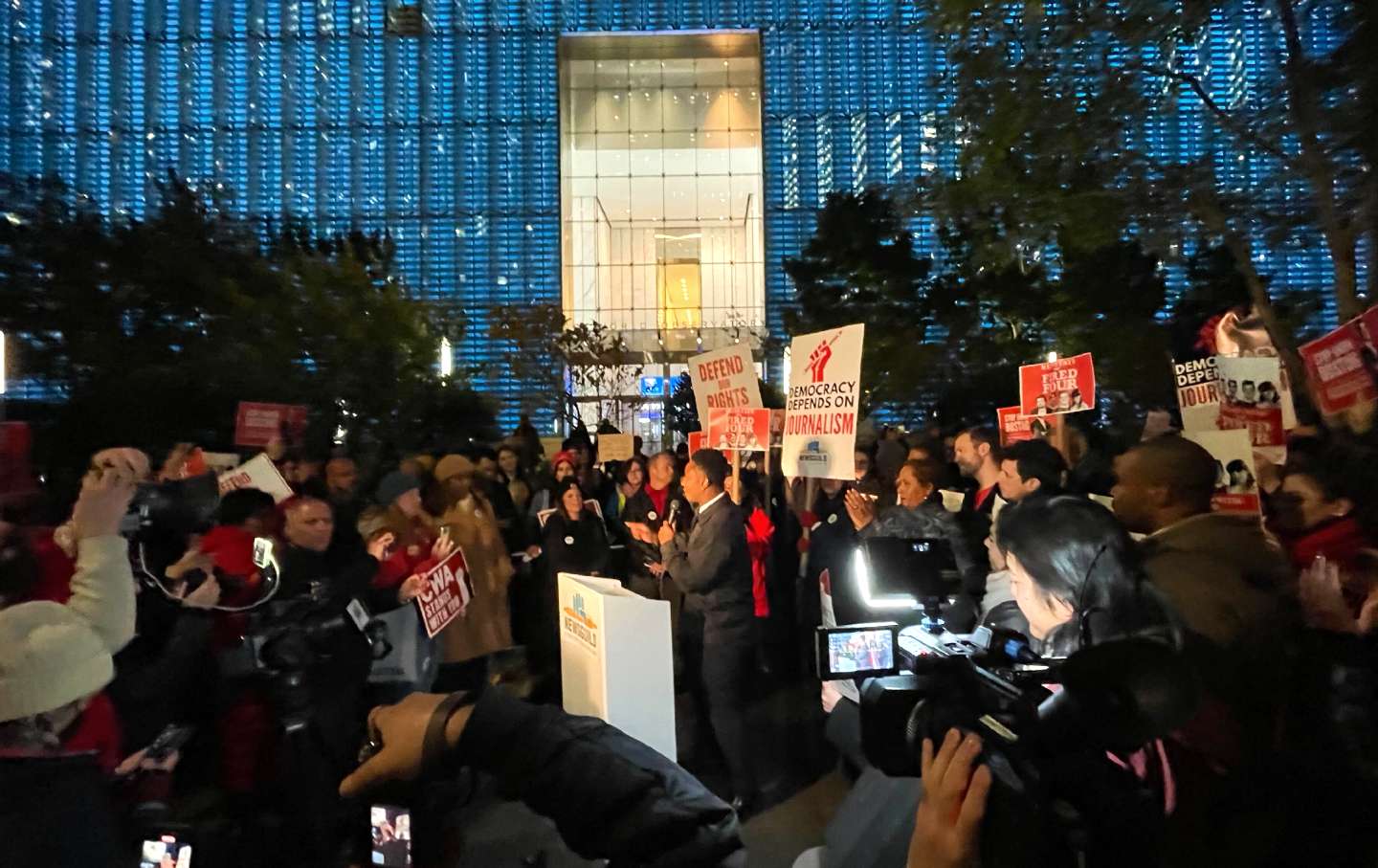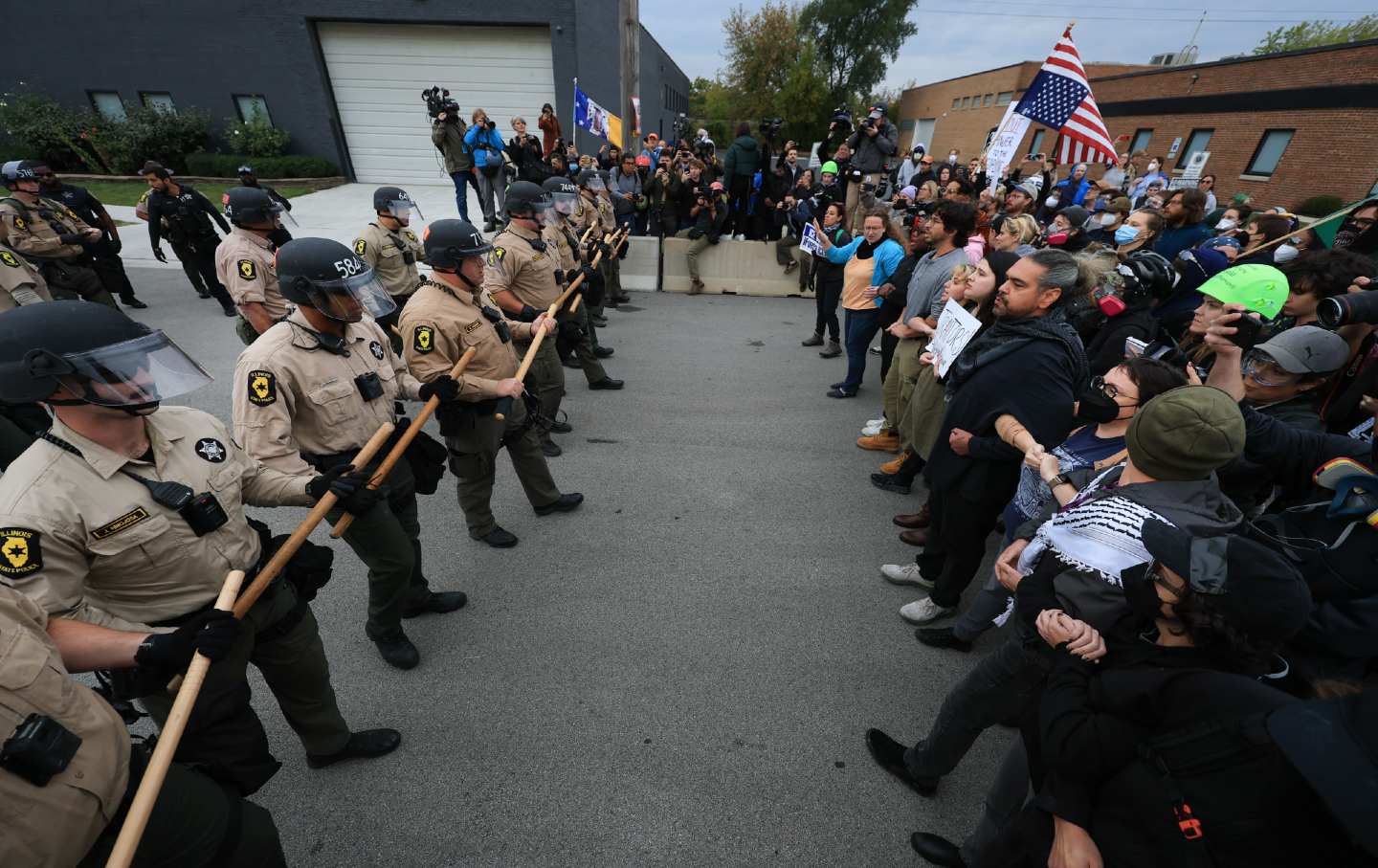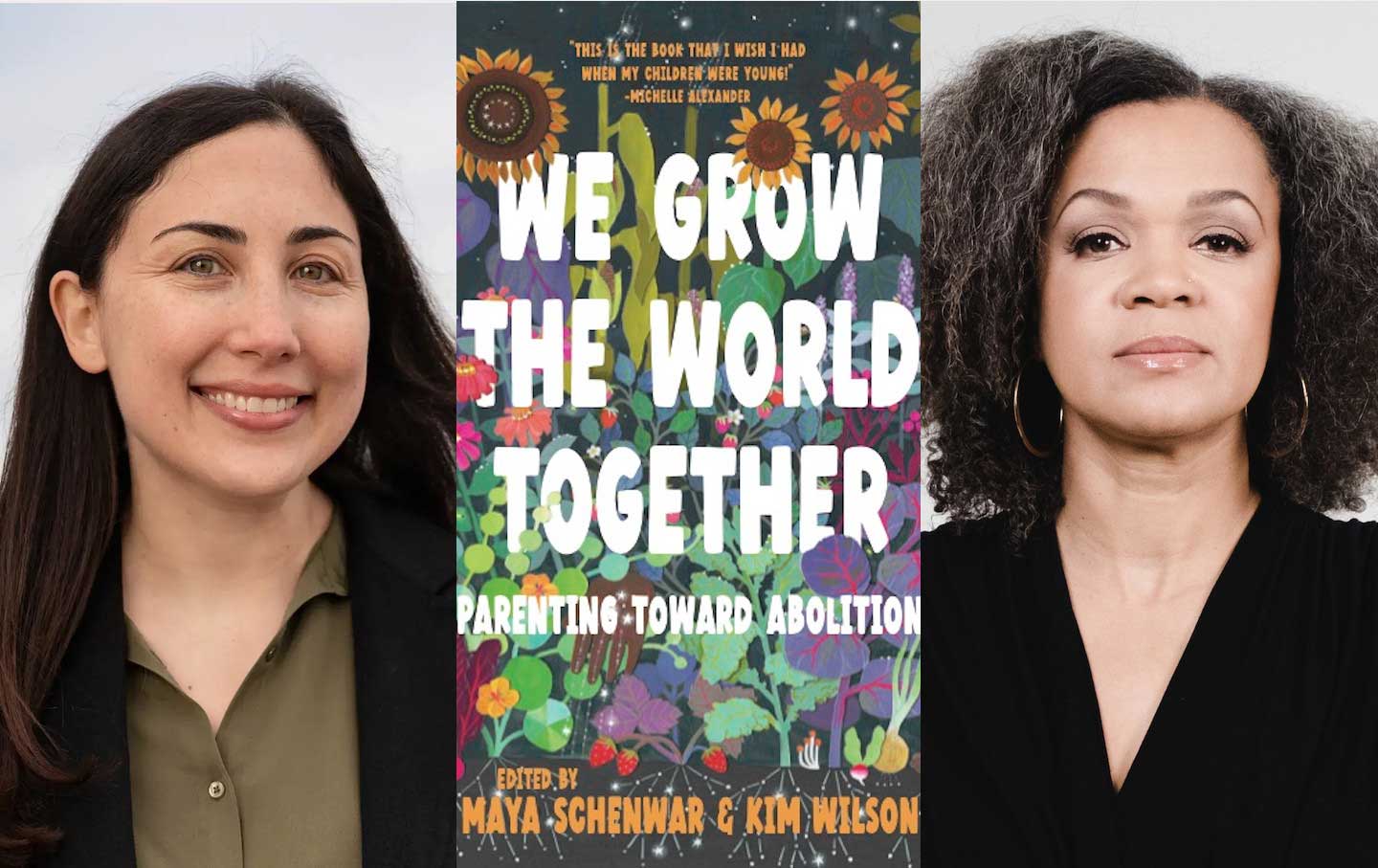
For most parents, our children’s safety is at the root of every decision we make. But policing, mass incarceration, and the surveillance and criminalization of poor communities and Black and brown people can make us feel powerless in keeping our children safe, no matter what decisions we make about our life or our children’s lives. Movement organizers who are parents feel this most acutely. The experience is isolating. Abolitionist organizer and author Maya Schenwar explained to me earlier this month that during the 2020 uprisings, as she was parenting her toddler, she remembers thinking, “We’re talking so much in movement spaces about care, and yet I feel so isolated from movement work because I have a young child.” Schenwar mentioned it to a friend, who told her, “That is the work. You are doing the work every day, caring for your kid.” This experience got Schenwar thinking about the relationship between organizing and parenting and how the experience of caregiving can go hand in hand with the world-building organizing work of abolitionists. This set her on the path to co-editing a new anthology, titled We Grow the World Together: Parenting Toward Abolition (Haymarket Books), with abolitionist organizer, educator, and artist Kim Wilson, who produces the Beyond Prisons podcast.
“I knew this was not a book I could simply just write alone,” said Schenwar, an editor-at-large at Truthout. “I’m not an expert, and if we’re honest, none of us are experts on parenting. This is something that most of our contributors write about in the book, that we are trying and failing and trying again, and failing better.”
As the parent of two sons who are currently sentenced to life in prison, as well as an adult daughter who is on the outside, Wilson told me that she’s been thinking about the interconnectedness between abolitionist organizing and parenting for a long time. “You have to reimagine how you parent someone who’s inside, and someone who’s dealing with these brutal systems every single day, and it’s relentless.” Wilson said. “And there were a lot of other [aspects of] movement work that I just could not be involved in, because [parenting children who are incarcerated] was, especially in the early days, all consuming.”
I spoke with Schenwar and Wilson about their new anthology, why it’s crucial to be clear that there’s no reproductive justice without a free Palestine, and what they wish for their children and all children.
—Regina Mahone
Regina Mahone: How did becoming a parent change or deepen your commitment to abolition?
Maya Schenwar: The initial part of this actually came when I became an aunt for the first time, and my sister was incarcerated. She found out she was pregnant when she was arrested and taken to jail when I think she was six weeks pregnant. So she was pregnant while in prison, gave birth while she was incarcerated, had 24 hours with my niece, and then they were torn apart. My niece was kind of languishing at the hospital for a while, and my sister was in prison trying to pump milk. It was this horrific situation where I was observing firsthand the most violent thing that I could possibly imagine, where this newborn baby was alone without her mother, thanks to this oppressive system that was supposedly keeping us—that broad us of society—safe. And for me, that was this shattering moment visiting my niece in the hospital and then my sister in prison. I had been an abolitionist for a long time, but that was the moment that really cut through where I felt it in my core that this system needs to be dismantled, crumbled to the ground.
That was a few years before I became a parent, and becoming an aunt deepened my commitment to dismantling, which is such a core part of abolition. And Kim reminds us of this—that, yes, we have to build the world we want to live in, and we can never forget that we constantly have to be taking things down brick by brick. The thing that having a child really brought home for me was [how] we talked so much in abolitionist movements about interdependence, about this idea that we have to take care of each other and that there is no alone. That in order for this to work in any kind of way, we need to actually have each other’s survival at the heart of what we do. Having a newborn baby put that into practice in such a tangible way—doing the smallest of tasks, like feeding, putting baby to bed, ensuring that the baby was warm, were part of a practice of interdependence that I felt really palpably. But also thinking about how to put those actions into words and how to connect them with my organizing, and particularly the group I’m involved in here in Chicago, the collective is called Love & Protect, is very much about supporting each other, supporting people inside, particularly criminalized survivors. And so that element of interdependence, that practice of immediate and constant interdependence, fueled my organizing work.
Kim Wilson: For me, I haven’t been an abolitionist, or haven’t identified as an abolitionist, my entire life. I feel that was an evolution that happened. My kids are all in their 30s, but I can think back to particular moments when, [for example,] my sons were being suspended from school a lot for minor infractions, which showed them that they did not matter within the context of the education system. And when they got older and they had been arrested, I had to go to court with them. All of these processes that you have to go through were just a vivid reminder that this [system] isn’t working.
Ruthie Gilmore talks about this concept of organized abandonment and how these systems operate to basically leave us all without resources, struggling, in pain, and desperate in a lot of ways. And one thing I was not going to do was abandon my kids. So at an interpersonal level, taking that concept and basically saying, I’m here, and I’m going to be here, and it’s going to be tough, but we’re going to stick it out.
There’s not a particular moment for me when I became an abolitionist. I felt like I was well on my way. By the time my sons were both arrested in 2011, I was firmly there. [Their arrests] drove me, and it made it so that I was like, “Where are my people?” I needed to find other people who were going to help me through this thing so that I could figure out what my role was going to be to show up not just for them, but for other folks [as well]. And it took a while. It was a progression of connecting with a lot of comrades and friends around the country, having countless conversations about incarceration, and not just on a personal level but also what this meant for us globally, because this is a global project of abolition and something that we need to think about in those terms.
RM: The book addresses how parents might feel conflicted about committing to abolition, because of this idea, rooted in white supremacy, that we are safer with police in our communities who will protect our children. One of those most important truths missing from this line of thinking, of course, is the lived experiences of parents who have incarcerated children, or parents who are incarcerated themselves, and the ways in which prisons and policing devastate lives and parental bonds. What is gained when we put parents who have incarcerated children or who are incarcerated themselves at the center of our vision for liberation?
KW: I think that part of what is gained is a new perspective in terms of what an aspirational abolitionist parenting practice can look like. I’m taking that term from Dylan Rodriguez. We had a conversation not long ago about upending the way that we think about parenting as this happy, two-parent household, very heteronormative, a kind of narrowly defined conceptualization of what it means to parent. It’s also the idea that you want these perfect little children, and you’re going to mold them into whatever image you want them to be. That’s not real, and so many parents feel like they are failures and secretly feel a lot of shame and a lot of pain around, “Oh, well, my child’s not fitting into this particular box.” What we’re saying is, the heck with the box. Let’s get rid of that box, and let’s think about this in a much more expansive way, because we’re all living under this capitalist hellscape and are forced to make decisions about our parenting that many of us would rather not make.
MS: One of the things that we wanted to do with the book was uplift the insights of children, partly in an act of countering that hierarchy. So the book starts with a piece by a child, EJ, who’s 6 years old, and her dad is incarcerated. EJ brings us into the feeling of having an incarcerated parent, the reality of it, and the inherent injustice of it. EJ says these specific things about the experience: My dad is in Connecticut, he is in jail, and I have all these things going on in my life. I’m living my day-to-day life, but he doesn’t know any of those things unless I tell him. That little detail of, “I have to tell him, I have to vicariously convey my life, even as a 6-year-old, to this person who’s one of my closest people, and I can’t visit him.” And she talks about the relationship of the police in all this, how the police are the force telling her what to do, maneuvering the lives of this family, even though the police are an outside force.
Popular
“swipe left below to view more authors”Swipe →We hope that people see that not only are children people and not only do we have to value and uplift every single child, but also that millions of children are actually experiencing the effects of these oppressive systems every single day, experiencing these minute to minute effects of parental incarceration.
Each contributor who talks about their own kids uplifts their kid’s insights and experience in a different way that fits into this multifaceted puzzle of abolition.
One of my favorite moments is when Harsha Walia is talking about her child and how her child received a copy of Harsha’s latest book, which is about borders, and her kid says, that’s a lot of words to say that borders are bad. Like her kid is critiquing the book, and Harsha is uplifting that it’s kind of like subverting this hierarchy. Her kids like, I don’t know. And Harsha is like, Well, how would you say it? And her kid goes into this whole kind of imagery about how all species cross borders, and bats are crossing borders, and honey badgers and whales are crossing borders all the time, and how this shows how borders are fictional and counter to the spirit of life. And her kid is like, Tell people that. And just that little anecdote is causing us to question how we see this top-down [approach to] teaching children things, and how part of abolition is sometimes flipping that or mixing that up.
RM: Since Israel launched its devastating assault on Palestinians in response to the October 7, 2023, attack by Hamas, it’s become clear that the concept of reproductive freedom for too many people is limited to the United States. In other words, the genocide of Palestinians is not seen as an issue some repro activists or advocates will take up as their own issue through that lens. But the essays in this book, particularly Heba Gowayed’s, make it clear that there is no reproductive freedom, no reproductive justice, without self-determination and statehood for Palestinians. Can you talk more about that and why it was important to be clear on this point that “None of us are free until Palestine is free?”
MS: It was really important to us even before October 7—because most of this book was finalized before October 7 of last year—to make clear that when we talk about the prison- industrial complex, we are also talking about the apparatus of Zionism, and that is part of this system that needs to be torn down in order for parenting justice to be real. Heba Gowayed’s essay makes that crystal clear. And of course, she was writing after the escalated genocide began, and she talks about how this experience of Palestinian parents is happening in what she calls unnatural conditions, occupation, apartheid, genocide. But what is also happening within those conditions is resistance. And she talks about how parental love fuels resistance, and that parenting a Palestinian child is simultaneously hating and resisting the fact that they are playing under the threat of bombs and the reality of bombs and the reality of mass murder of their families and their people, and this idea that love fuels resistance carries through.
It’s about reproductive justice in Palestine, and it’s about reproductive justice here and around the world. I saw that concept as being very tied to, for example, Dorothy Roberts’s essay about how mothers are turning state violence against their kids into a driving force to mobilize against the family policing system that is stealing their children in the United States, and I see it as very tied to Ruth Wilson Gilmore’s piece about this response among mothers in California to the system locking up their sons and that being a mobilizing force—love, fueling resistance against the system as a whole. Nadine Nabers’s essay is really important to tie in here, too, where she brings in threads of colonization and how the nuclear family, this hetero-patriarchal nuclear family, has been a tool of imperialism, a tool of colonialism, and how we need to resist that, both in the streets and at home.
KW: I’ve been thinking about this for a while, and had written something down, so I’ll just share a little bit about that. What I wrote was, there is no parenting justice without a free Palestine. We cannot seriously engage in conversations about parenting and caregiving while ignoring an almost 100 yearlong forced displacement and extermination project that is being conducted by the Israeli settler-colonial state against the Palestinian people. I feel like the power of the book is that it says we’re not taking this for granted anymore, [and] that this is something that needs to be central to our conversations.
RM: In Sarah Tyson’s essay, readers are encouraged to think beyond the idea of creating a happy child. I wanted to ask you both, what is your wish for your children and for other children around the world?
KW: Liberation, right? But it’s also, and again I’m quoting Dylan, who says that it’s our obligation. Abolition is our obligation. That is my wish, but it’s also the driving force for what I do. It’s what wakes me up at 3 am and keeps me up for several hours. It’s what motivates me, because, especially for younger children, they’re coming into a world they didn’t create. And they don’t get to choose a lot of things. One of the things that Sarah Tyson and I talked about when I interviewed her for the podcast, was that she would love for her kids to be able to just run freely in a park—she wants that for all children. She talks about Tamir Rice and the fact that he was playing in a park and he was murdered. Our wishes are things that seem really small, but they are also really big. It’s like when I talk about my sons being incarcerated. I always say they are currently sentenced to life in prison, because for me that is a temporary state of things. And whether that temporariness is another couple of years, or whether it’s 10 years or longer, it’s still temporary. There is absolutely no way that they remain incarcerated. And I feel that for other parents who are incarcerated parents as well, that the best we can do is to get rid of these horrible death-making systems that are killing our loved ones, that are killing us slowly, that are destroying our communities. And while we’re destroying that stuff, we’re also building simultaneously. It’s a both-and. I am always the killjoy in the room, always saying, yes, we want to build things, but we also need to remember that we need to tear things down as well.
MS: You’re not actually a killjoy, because you always bring joy to my life. Whenever I hear you talk, I learn something new. But this was a really powerful question, because it ties in with the central thread of the book, which is this concept of seeing all children as our children. A number of the authors challenge us to do [it], including Mariame Kaba, who speaks about the challenges posed to us by children’s books, which can be used as abolitionist texts, and what would that world look like.
It’s true that as our children get older [they will] move through a world of increasing struggle. This is not a world where we’re just naively saying, Oh, the next decades will bring progress and growth and… no. We are facing down climate apocalypse, [and] all these potential threads of increasing fascism. This world to come is not an easy one for anybody. But we also have to think about the components of what we are creating and doing. My partner Ryann Willow wrote about how to talk to kids about war and incarceration. I love this essay, because I think it holds a little thread of that future for our kid and for all kids. What my partner came to in this process of grappling with [all of these concepts, like] how do you talk to kids about these tough things… Like some people can shelter their kids for as long as possible from these concepts. Other kids are in the middle of war or in the middle of incarceration. Or, for my kid, very early on their aunt died after a whole adult lifetime incarcerated in this death-making system that made death for her. So how do we talk to our kids? And the thing that my partner came to was this idea that when we introduce these concepts with our children, we can always introduce the fact that wherever there is crisis, wherever there’s an injustice, there is also a struggle for liberation. There is also resistance. There is also creation and building. And she talks about how at the same time as we’re teaching our children words like “war” and “incarceration” and “genocide,” we can also be teaching them the words “curiosity,” “solidarity,” “liberation,” “resistance,” “courage.” Those are all things that that I want for my child and all children as they are facing down this difficult future.
Time is running out to have your gift matched
In this time of unrelenting, often unprecedented cruelty and lawlessness, I’m grateful for Nation readers like you.
So many of you have taken to the streets, organized in your neighborhood and with your union, and showed up at the ballot box to vote for progressive candidates. You’re proving that it is possible—to paraphrase the legendary Patti Smith—to redeem the work of the fools running our government.
And as we head into 2026, I promise that The Nation will fight like never before for justice, humanity, and dignity in these United States.
At a time when most news organizations are either cutting budgets or cozying up to Trump by bringing in right-wing propagandists, The Nation’s writers, editors, copy editors, fact-checkers, and illustrators confront head-on the administration’s deadly abuses of power, blatant corruption, and deconstruction of both government and civil society.
We couldn’t do this crucial work without you.
Through the end of the year, a generous donor is matching all donations to The Nation’s independent journalism up to $75,000. But the end of the year is now only days away.
Time is running out to have your gift doubled. Don’t wait—donate now to ensure that our newsroom has the full $150,000 to start the new year.
Another world really is possible. Together, we can and will win it!
Love and Solidarity,
John Nichols
Executive Editor, The Nation

